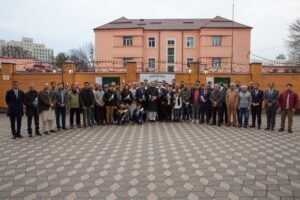
On March 23, the Islamic Cultural Center of the capital hosted a solemn Iftar in honor of the holy month of Ramadan and the Day of Pakistan. This event became a meeting place for Pakistani citizens living in Ukraine, as well as other distinguished guests.
The event began with a traditional prayer, after which the Ambassador Extraordinary and Plenipotentiary of the Islamic Republic of Pakistan, H.E. Major General (Retired) Nadir Khan delivered a speech in which he quoted the main points from the address to the Pakistani nation by the President of the Republic Asif Ali Zardari.
In his address, the President of Pakistan emphasized the importance of the historic “Pakistan Resolution” of 1940, which marked the beginning of the formation of an independent state. He recalled the tireless efforts and sacrifices of the ancestors for the sake of freedom and emphasized the importance of unity and joint efforts in overcoming current challenges such as inflation, unemployment and terrorism.

Emphasizing his commitment to democratic values and economic recovery, the President also called on citizens to unite for a future “full of peace, progress and stability.”
“Let us work for a Pakistan that is united around common values,” he emphasized, calling for a state where there are no differences but unity.

The Islamic Republic of Pakistan recognized Ukraine’s independence on December 31, 1991. On March 16, 1992, diplomatic relations between Ukraine and Pakistan were established. The Embassy of Pakistan has been operating in Kyiv since October 1997.
Photo source: https://www.facebook.com/UkrDiplomatic
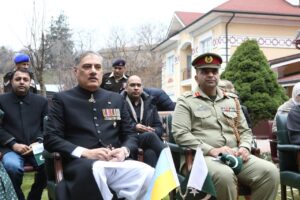
On March 23, 2024, the Embassy of the Islamic Republic of Pakistan in Ukraine held a solemn ceremony of raising the national flag on the occasion of Pakistan Day.
Every year on March 23, Pakistanis celebrate the adoption of the Pakistan Resolution of 1940 by the All India Muslim League in Lahore on the creation of an independent state for Muslims.

Since then, the struggle for the creation of Pakistan intensified and only seven years after the adoption of the Pakistan Resolution on August 14, 1947, Pakistan emerged.
After the reading of the Holy Quran, the Ambassador Extraordinary and Plenipotentiary of the Islamic Republic of Pakistan, H.E. Major General (Retired) Nadir Khan raised the national flag during the performance of the national anthem of Pakistan.
Messages from the President of Pakistan Mr. Asif Ali Zardari, Prime Minister Mr. Shahbaz Sharif and Minister for Foreign Affairs of Pakistan Mr. Mohammad Ishaq Dar were also read out.
The ceremony concluded with a prayer for the well-being and prosperity of the people of Pakistan, the Muslim Ummah and humanity, as well as for the return of peace and prosperity to Ukraine.
The Islamic Republic of Pakistan recognized the independence of Ukraine on December 31, 1991. On March 16, 1992, diplomatic relations between Ukraine and Pakistan were established. The Embassy of Pakistan has been operating in Kyiv since October 1997.
Photo source: https://www.facebook.com/UkrDiplomatic
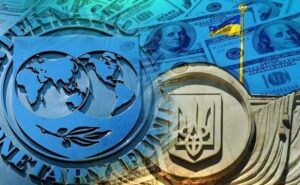
The International Monetary Fund (IMF), following the third revision of Ukraine’s EFF Extended Fund Facility program, still considers the baseline scenario as the end of active hostilities in 2024, however, in the updated negative scenario, where the assumption of a more intense war that will last into 2025 remains, the Fund has slightly improved the macro outlook.
“Assuming that the shock starts in the second quarter of 2024, the contraction of the economy reaches 4% in 2024, compared to growth of 3-4% in the baseline scenario. A longer and more intense war is expected to have a significant impact on economic sentiment, the rate of return of migrants, fiscal spending needs, and export capacity,” the IMF said in a submission published on its website.
According to its estimates, inflation in 2024 in such a negative scenario will also be higher – 10% compared to 8.5% in the baseline scenario.
At the same time, last December, after the second revision of the program, the IMF in the negative scenario for 2024 expected a decline in GDP by 5% with inflation of 11%.
As for 2025, the forecast of GDP growth and inflation in the negative scenario was kept at the same level – 0% and 8.5%, respectively, while in the baseline scenario the Fund expects economic growth of 6.5% with inflation of 7%.
In addition, the updated negative scenario significantly improved the estimate of the trade deficit for this year – by $5.8 bln to $33.1 bln ($28.7 bln in the base case), respectively, the NBU reserves will be reduced to $34.4 bln ($42.1 bln in the base case), not $32.4 bln, as expected in December.
In addition, the forecast of the state budget deficit has been raised by 1.4 percentage points (p.p.) to 17.6% of GDP (13.7% of GDP in the base case), while the estimate of the state debt has been reduced by 5.5 p.p.. – to 105.9% of GDP (94% of GDP in the base case).
“Given the reserve holdings, some intervention is expected to prevent excessive exchange rate volatility and inflation carryover. Unlike in the baseline scenario, in the downside scenario, inflation will take longer to return to the target level,” the materials said.
According to them, the estimate of the increase in donor funding compared to the baseline scenario was left unchanged at $140.6 billion versus $121.8 billion in the baseline scenario.
“If the severity of shocks takes the country beyond the downside scenario, additional measures may be required, and the authorities have the commitment and capacity to implement them. Repeated shocks beyond the downside scenario could force the authorities to take temporary unconventional measures,” the Fund also pointed out.
Depending on the size of the financing need, according to IMF experts, extraordinary measures that could further raise revenues (e.g. a solidarity tax as a complement to the personal income tax, and/or an additional tax on luxury goods, or excise taxes/levies) and mobilization of domestic bond financing on an even larger scale, as well as monetary financing within program parameters, may be needed. “The latter could include, if necessary, administrative measures requiring banks to hold government securities at a set amount or with a minimum holding period, possibly differentiating banks according to individual liquidity conditions. Secondary purchases of government bonds by the NBU could also support the primary market,” the Fund explained.
Instruments such as inflation- or exchange rate-linked bonds could also be considered, he said.
In addition, says MF, while the scope for fiscal tightening is limited, it will have to be considered as well, as ultimately spending in some categories depends on the inflow of external financing.
“Overall, the extensive discussions with the authorities on contingency plans during the Third Review reaffirm that the program remains credible even in the event of such a negative scenario. The authorities’ political commitment and track record, as well as renewed financial guarantees from international partners and expected debt relief, give confidence that even in this updated deterioration scenario, the program’s objectives of maintaining macroeconomic and financial stability and restoring debt sustainability in the future will be achieved,” the Fund concluded, noting that the authorities are prepared to take appropriate policy measures if necessary.
It is specified that in the fiscal sphere, the bulk of the adjustment will be done through fiscal measures that can be effectively and quickly implemented to increase revenues, while some expenditures should be made contingent on available financing.
“Temporary pressure on the managed floating exchange rate regime under the negative scenario may require the reintroduction of some of the exchange controls used earlier during the war,” the IMF also noted.
The materials note that the risks to both forecasts – both basic and negative – remain extremely significant and continue to develop against the background of prevailing uncertainty. Among the main risks, the Fund categorized the risks associated with a serious shortfall in external financing and/or the impact of a more intense and prolonged war. It is explained that shortages or prolonged delays in donor funding could require the authorities to take swift countermeasures to overcome liquidity pressures, which could weaken confidence and further dampen growth, and be potentially destabilizing if uncertainty lasts too long.
Whereas, as the war continues, defense spending needs could increase significantly due to mobilization and increased intensity of hostilities, which could negatively affect confidence and lead to financing gaps.
“In the event of serious negative shocks, the authorities may resort to suboptimal measures (e.g., accumulation of budgetary arrears and cuts in social spending). The negative sentiment that may arise from this could lead to social unrest,” indicated another IMF risk.
It is emphasized that the 2025 budget will need to take into account continued risks and allow for greater Ukrainian autonomy to meet priority expenditures. “While the baseline scenario expects the war to end by the end of 2024, significant needs for defense, reconstruction, social protection, and economic development are likely to remain. At the same time, external budgetary support, while still substantial, is expected to decline sharply. Thus, additional efforts to increase revenues will be required,” the Fund noted.
According to the updated program, while in 2023 external financing amounted to $42.5 billion, and this year it is projected at $38.1 billion, next year it is expected to drop to $22.9 billion.
Earlier, the Experts Club think tank released a video on how countries’ GDPs have been changing in recent years, more video analysis is available here –
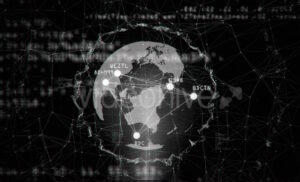
The article collects and analyzes the main macroeconomic indicators of Ukraine. In connection with the entry into force of the Law of Ukraine “On Protection of the Interests of Economic Entities during Martial Law or State of War” the State Statistics Service of Ukraine suspends the publication of statistical information for the period of martial law, as well as for three months from the date of its completion.
The exception is the publication of information about the consumer price index, separate information on statistical indicators of 2021 and for the period January-February 2022. The article analyzes open data from the State Statistics Committee, the National Bank and analytical centers.
Maxim Urakin, PhD in Economics, presented an analysis of macroeconomic trends in Ukraine and the world based on official data from the State Statistics Committee of Ukraine, the NBU, the UN, the IMF and the World Bank.
Macroeconomic indicators of Ukraine
Maxim Urakin cited data from the National Bank of Ukraine on the improvement of the financial situation in 2023 compared to 2022.
“Last year was marked by more favorable macroeconomic conditions for the financial industry. GDP growth generally exceeded forecasts, and inflation rates declined. Even after the downgrade, the discount rate remains high enough to make hryvnia investments attractive. Thanks to the efforts of the National Bank and market readiness, the transition to a policy of managed flexibility of the hryvnia exchange rate was successful. At the same time, this success was ensured primarily by stable receipts from partners within the framework of macrofinancial assistance and an increase in the share of exports of agricultural products,” Urakin emphasized.
The expert noted that the main risks for the economy remain the duration of the war and instability of international aid.
“In the third quarter of 2023, Ukraine’s GDP growth slowed to 8.2%. The negative balance of foreign trade increased by 3.2 times, which is a worrying signal. Public debt has slightly decreased compared to August figures, but already in 2024 it may exceed the country’s GDP for the first time, which poses significant risks to economic stability,” the economist said.
The pace of international aid to Ukraine, in turn, has fallen significantly in Q4 2023 – Q1 2024, which could negatively affect the economic recovery this year amid the war.
Global Economic Outlook
Maxim Urakin also analyzed the global economy, noting a slowdown in growth in 2024 to 2.2%.
“The analysis of global GDP dynamics shows that the global economy continues to recover from the pandemic, but geopolitical instability has a restraining effect on this growth. According to Maxim Urakin, it is important to monitor developments and adapt to changing conditions to ensure sustainable economic growth in the future. Ukraine, in this context, needs to focus on strengthening domestic political stability, restoring its economic potential and continuing reforms to improve its post-war prospects and strengthen its position on the global stage,” the expert explained.
According to the expert, the current macroeconomic situation in Ukraine and the world requires further analysis. For Ukraine, the main challenges in the coming years will be the need to rebuild Ukraine after the war and public debt management.
Earlier, the Experts Club analytical center released a video on how the GDP of countries has been changing in recent years, more detailed video analysis is available here.

PJSC Ukrnafta has bought a special licence from Chernihivnaftohazgeologiya (a subsidiary of state-run NJSC Nadra Ukrayiny), the company’s director, Serhiy Koretskyy, said on Facebook.
According to him, thanks to the new licence, Ukrnafta will receive an increase in total reserves by 1.01bn cu.m. of gas and 100,000 tonnes of oil in 56.5 sq km of areas in north-eastern Ukraine.
Koretskyy also noted that this is the first special permit obtained by Ukrnafta in the last 14 years.
As reported, Ukrnafta in 2023 increased production of oil with condensate by 3% (by 39.9 thousand tonnes) compared to 2022 – to 1 million 409.9 thousand tonnes, gas – by 5.8% (by 60.4 million cubic metres), to 1 billion 97.4 million cubic metres.
The company’s strategic goal is to double its oil and natural gas production to 3 million tonnes and 2 billion cubic metres respectively by 2027.
“Ukrnafta, Ukraine’s largest oil producer, is the operator of a national network of 537 petrol stations, of which 456 are operational. The Company is implementing a comprehensive programme to restart operations and update the format of its network of petrol stations. Since February 2023, Ukrnafta has been issuing its own fuel coupons and NAFTACard, sold to legal entities and individuals through Ukrnafta-Postach LLC.
Ukrnafta’s largest shareholder is Naftogaz of Ukraine with a 50%+1 share stake. On 5 November 2022, the Supreme Commander-in-Chief of the Ukrainian Armed Forces decided to transfer to the state a share of the corporate rights of the company owned by private owners, which is now managed by the Ministry of Defence.
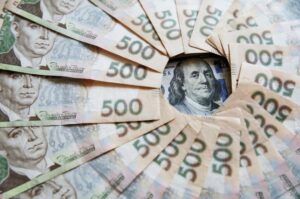
Reference UAH/USD exchange rate in the interbank foreign exchange market as of 12:00 on March 22, 2024.
Indicator 21.03.2024 22.03.2024 Change, %
Reference UAH/USD exchange rate (UAH/$) 38.9287 38.7982 -0.34
Data: NBU